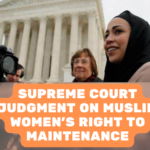Puja Khedkar, a probationary IAS officer from the 2022 batch, is under scrutiny by the Department of Personnel and Training (DoPT) for alleged misconduct and issues related to her appointment under the OBC and PH quotas. Despite a low rank, she secured a position in the IAS through these reservations. Allegations have arisen questioning the validity of her OBC and PH certificates. If proven falsified, she could face discharge from service. Additionally, she failed to attend a mandatory medical examination for her PH status, citing reasons such as a COVID-19 infection. Critics also question her eligibility for OBC benefits due to her family’s political background and her father’s former government service.
Rules Governing Civil Servants in India
Rules on Integrity of Services
- All-India Services (Conduct) Rules:
- Govern IAS, IPS, and IFoS officers from the time they join their respective services and begin their probation period.
- Integrity and Devotion to Duty:
- Rule 3(1): Officers must uphold absolute integrity and dedication to their duties at all times.
- Gifts and Benefits:
- Rule 11(1): Officers may accept gifts only from near relatives, with strict reporting requirements for any gift exceeding Rs 25,000 to prevent influence on their duties.
- Unbecoming of an Officer:
- Rule 4(1): Officers must not use their position or influence to secure employment for any family member with private undertakings or NGOs.
- Property Details:
- Rule 13: Officers must annually submit property returns detailing all immovable properties owned, inherited, acquired, or held through lease or mortgage by themselves or family members.
- Sub-Rules Added in 2014:
- Added standards include maintaining high ethical standards, integrity, honesty, political neutrality, accountability, transparency, responsiveness to the public, and courtesy in public interactions.
Rules for Probationers
- IAS (Probation) Rules:
- Probationers undergo training at LBSNAA in Mussoorie and must pass an examination at the end of two years to be confirmed in their service.
- Salary and Allowances:
- Probationers receive a fixed salary and travel allowance but do not have entitlements like an official car, official accommodation, or an official chamber with staff.
- Probationer Discharge:
- Rule 12: Circumstances for discharge include being found ineligible or unsuitable by the central government, neglecting duties, or lacking essential service qualities.
- Enquiry Process:
- If disciplinary action is initiated, a summary enquiry by a DoPT-appointed committee submits its report within two weeks to inform decisions regarding the probationer’s status.
Ethical Issues Concerning Puja Khedkar’s Case
- Misuse of Reservation Quotas:
- Allegations that Khedkar may have falsely claimed OBC and PH status to secure a position in the IAS, exploiting affirmative action meant for disadvantaged groups.
- Misconduct and Special Privileges:
- Accusations include seeking undue privileges, such as using an unauthorized beacon on her car and occupying official premises improperly.
- Falsification of Documents:
- Concerns were raised about the authenticity of her OBC and PH certificates, which, if proven false, could indicate deception in securing her civil service appointment.
- Integrity and Ethical Conduct:
- Questions about adherence to the All India Services (Conduct) Rules, including maintaining integrity, avoiding misuse of position, and transparency in dealings.
- Legal and Disciplinary Violations:
- Issues related to disciplinary actions for failure to attend mandatory medical examinations and other alleged breaches of conduct as outlined by the rules for probationers.
- Public Trust and Accountability:
- Impact on public trust in the civil service, given the sensitive nature of the allegations and the importance of ethical behaviour in upholding the integrity of governance.
Other Rules Regarding the Conduct of Civil Servants
- Code of Conduct for Civil Servants:
- Mandates that every member of the service maintains integrity and honesty, political neutrality, promotion of merit, fairness, and impartiality, accountability and transparency, responsiveness to the public, particularly the weaker sections, and courtesy and good behaviour towards the public.
- Draft Public Service Bill (2007):
- Proposed by the Ministry of Personnel, Public Grievances, and Pensions to establish generic standards known as “values” for civil servants. Major values include:
- Allegiance to constitutional ideals
- Apolitical functioning
- Prioritization of good governance for public welfare
- Objective and impartial duty performance
- Accountability and transparent decision-making
- Highest ethical standards maintenance
- Merit-based selection respecting cultural and ethnic diversities
- Economy in expenditure
- Promotion of a healthy work environment
- Communication, consultation, and cooperation in management
Committee Recommendations
- Santhanam Committee (1964):
- Recommended reforms in recruitment processes and ethical standards for civil servants.
- Hota Committee (2003):
- Suggested measures to enhance transparency and merit-based selection in civil service recruitment.
- Second ARC (2006):
- Advocated for reforms to improve efficiency and accountability in recruitment and training.
- Alagh Committee (2008):
- Proposed reforms to align civil service selection processes with modern requirements.
- Khanna Committee (2010):
- Examined issues related to civil service reforms and competency in public service delivery.
Conclusion
The Puja Khedkar controversy highlights the critical need for honesty and transparency in civil services. Rules are in place to prevent misuse of authority for personal benefit. The incident also prompts scrutiny of the reservation system’s integrity and implementation. Ethics are pivotal in ensuring public trust and confidence in civil service operations.



